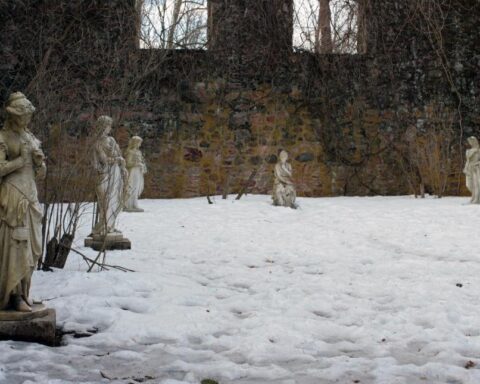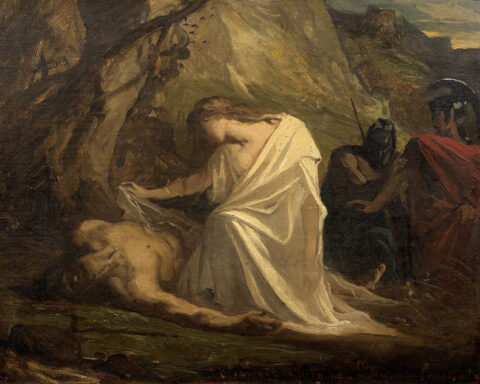“I’m going to turn them down,” he said.
She glanced at him and then across the lake as they made their way down the slope from the house. She thought a life went one direction rather than another because of a few big decisions. What to study, who to marry, whether to have kids. What work you did.
“It’s a huge opportunity,” he said. “But I can’t take the risk.”
The slate water rippled with reflections of the afternoon sun. The past week the nights had grown cold. On the other side she saw splashes of red among the green. A maple at the end of the point already blazed with gold.
“You have to think first of yourself,” she said. “What you want.”
But even as she spoke, she knew he wouldn’t. She wasn’t sure he could. It was one of the things about him she admired. But she was afraid he would take a decision now that later he’d regret. That he would come to blame her or, worse, the baby.
“I have to think of all of us,” he said.
Rough-cut steps in the earth led down the last few feet to the small gravelly beach. She stopped to let him go ahead. Following, she noticed the pale circle at the back of his head where his hair had started to thin.
“Why don’t you talk to your dad?” she asked when they were down by the water.
His parents still didn’t know. When they’d arrived Friday night from the city, the lights in the kitchen dazzling after hours in the car with only the green glow of the instrument panel, he hadn’t said anything, even after she’d fed the baby and settled him in the bassinet in the guest room and they were all sitting in front of the fire. The talk had been about the weather, the garden, the roadwork out by the highway. Diapers, feeding schedules, broken nights. Nothing about the phone call earlier in the week.
“It’s not my dad’s problem,” he said. He picked up a stone and sent it skipping across the water.
She had known he was going to say something like that. Men were stubborn, always trying to prove they didn’t need anything or anyone.
“Anyway, what would he know?” he added.
Maybe nothing, she thought. His father was a gruff man who dealt in hard things: concrete, lumber, contracts with penalty clauses. But he’d made decisions in his life. He’d raised a family. He’d built this house at the lake twenty years before. And last night he had let his rough hand rest lightly on her shoulder as he leaned down to peer at the baby’s face. He might offer advice. Even promise a loan if they needed one later. Although she knew getting her husband to accept any help would be another struggle.
“It’s a different world now,” he said.
She shoved her hands into the pockets of the old sweater coat that his mother had taken for her from the closet by the front door. Beige wool knitted up with brown that formed the shape of a bear on either side of the zip. It had been in the family for years, handed down from one boy to the next. “It’s cool out,” his mother had said, holding it up for her to put on. “Don’t worry, he’ll be fine,” she’d added. She’d meant, of course, the baby.
A crow flew overhead and out across the lake calling caw caw caw.
They walked along the shoreline all around the bay, jumping over little rivulets, climbing up onto the bank where the water came right up to the land. He took the hoodie whose sleeves had hung over his shoulders and pulled it on. At the far end of the bay, a series of granite rocks projected out into the water. Rounded tops and jagged cracks, with splotches of gray-green and orange lichen. He stepped up onto the first rock and then hopped from one to the other, holding his arms out either side.
“Don’t fall in,” she warned from the safety of the shore. “I won’t jump in and save you.”
“I won’t.”
It was the first time she had seen him smile all week. He stood on the last rock with his toes over the edge, looking down.
“What do you see?” she asked.
“Weeds. The remains of a log. There’s a silty bottom you’d sink into if you tried to stand.”
She wondered if it would be different if she went back to work. He might not feel that it all depended on him. But for now their child was everything to her. More important than he was. She felt it might be years before she could bear to leave the baby for as long as half a day.
“We should head back,” she said. It had only been two hours since the last feeding, but already she could feel an ache in her breasts. She knew she should spend more time alone with her husband, talking, listening, holding his hand, but she felt an urgent need to see her child and make sure he was all right. To feel the heft of his body in her arms.
“We can walk along the road,” he said.
They climbed up from the lake through the pines and over soft needle-strewn ground to an open stretch of graded earth and gravel. The breeze had picked up, making the tall grasses on the other side of the road sway and hiss. At the end of the year they would be back here but with foot-deep snow everywhere, ice covering the lake, wind scratching at their bright red cheeks and cold freezing their fingertips even through thick gloves. She hoped he wouldn’t have changed his mind by then. Or ever.
She slipped her hand through his arm and they walked side by side along the road that led back to the house.



